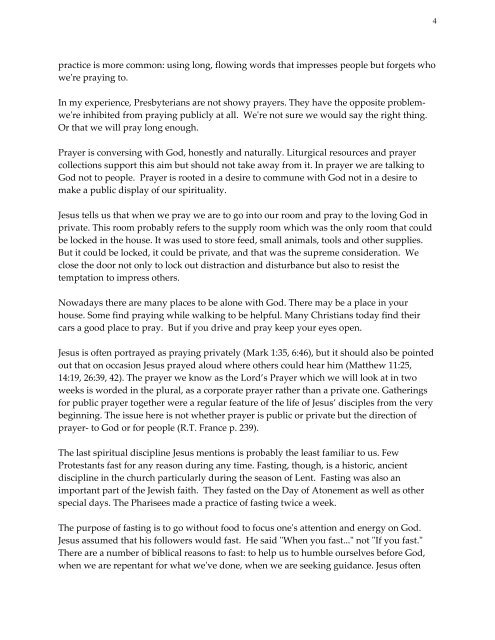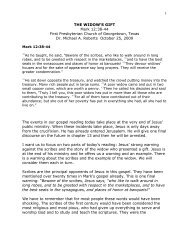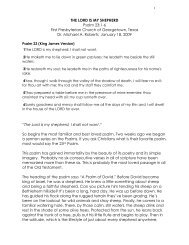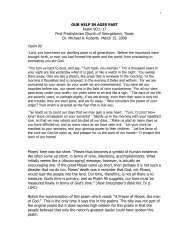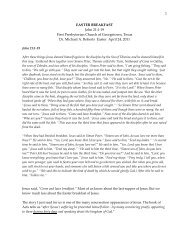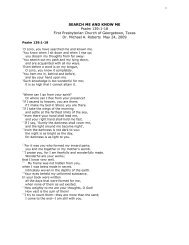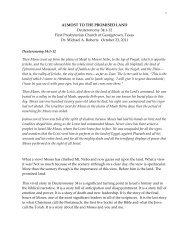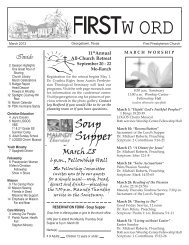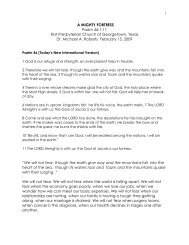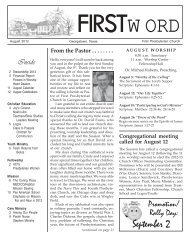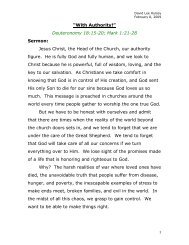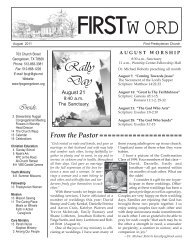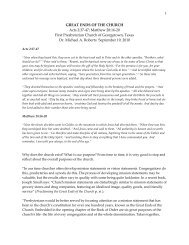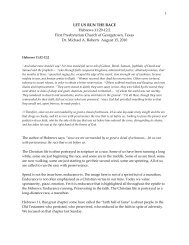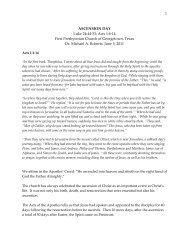SPIRITUAL SHOWINESS Matthew 6:1-6, 16-18 First Presbyterian ...
SPIRITUAL SHOWINESS Matthew 6:1-6, 16-18 First Presbyterian ...
SPIRITUAL SHOWINESS Matthew 6:1-6, 16-18 First Presbyterian ...
You also want an ePaper? Increase the reach of your titles
YUMPU automatically turns print PDFs into web optimized ePapers that Google loves.
4<br />
practice is more common: using long, flowing words that impresses people but forgets who<br />
we're praying to.<br />
In my experience, <strong>Presbyterian</strong>s are not showy prayers. They have the opposite problemwe're<br />
inhibited from praying publicly at all. We're not sure we would say the right thing.<br />
Or that we will pray long enough.<br />
Prayer is conversing with God, honestly and naturally. Liturgical resources and prayer<br />
collections support this aim but should not take away from it. In prayer we are talking to<br />
God not to people. Prayer is rooted in a desire to commune with God not in a desire to<br />
make a public display of our spirituality.<br />
Jesus tells us that when we pray we are to go into our room and pray to the loving God in<br />
private. This room probably refers to the supply room which was the only room that could<br />
be locked in the house. It was used to store feed, small animals, tools and other supplies.<br />
But it could be locked, it could be private, and that was the supreme consideration. We<br />
close the door not only to lock out distraction and disturbance but also to resist the<br />
temptation to impress others.<br />
Nowadays there are many places to be alone with God. There may be a place in your<br />
house. Some find praying while walking to be helpful. Many Christians today find their<br />
cars a good place to pray. But if you drive and pray keep your eyes open.<br />
Jesus is often portrayed as praying privately (Mark 1:35, 6:46), but it should also be pointed<br />
out that on occasion Jesus prayed aloud where others could hear him (<strong>Matthew</strong> 11:25,<br />
14:19, 26:39, 42). The prayer we know as the Lord’s Prayer which we will look at in two<br />
weeks is worded in the plural, as a corporate prayer rather than a private one. Gatherings<br />
for public prayer together were a regular feature of the life of Jesus’ disciples from the very<br />
beginning. The issue here is not whether prayer is public or private but the direction of<br />
prayer- to God or for people (R.T. France p. 239).<br />
The last spiritual discipline Jesus mentions is probably the least familiar to us. Few<br />
Protestants fast for any reason during any time. Fasting, though, is a historic, ancient<br />
discipline in the church particularly during the season of Lent. Fasting was also an<br />
important part of the Jewish faith. They fasted on the Day of Atonement as well as other<br />
special days. The Pharisees made a practice of fasting twice a week.<br />
The purpose of fasting is to go without food to focus one's attention and energy on God.<br />
Jesus assumed that his followers would fast. He said "When you fast..." not "If you fast."<br />
There are a number of biblical reasons to fast: to help us to humble ourselves before God,<br />
when we are repentant for what we've done, when we are seeking guidance. Jesus often


